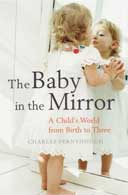
The Baby in the Mirror: A Child's World from Birth to Three
Charles Fernyhough
Granta £12.99, 288pp
To have one developmental psychologist as a parent might be thought a misfortune; to have two is plain carelessness. Yet such is the fate of young Athena Fernyhough, subject, object and experimental participant of The Baby in the Mirror, a painstakingly observed, exquisitely written voyage of discovery into the first three years of life as experienced by a child. It doesn't quite ring true when Charles Fernyhough claims he's just doing what all parents do: observing his firstborn's emerging personality with awe and wonder. Most parents don't scrutinise their child's development with quite this degree of intellectual curiosity, and most parents don't write books about it. But the result of Fernyhough's observations is an unusual and beautiful hybrid: a textbook suffused with tenderness, a memoir rooted in research.
The journey begins in the dim chamber of the womb, where alongside sounds from the outside world, the press of parental projections and aspirations are already making themselves felt. It ends with Athena tentatively discussing her feelings about the book her father has written. In between, Fernyhough charts in detail his daughter's mastery of the multiple tasks of childhood: the trials and tribulations of learning to walk and talk, dress, express, assert and control herself.
What really interests Fernyhough is the thinking behind all this learning. Whether they are strolling along river banks, passing time in shopping malls, doing jigsaw puzzles or playing I Spy on car journeys, he is constantly trying to piece together the experience from his daughter's viewpoint. Through the developmental tasks of doing, he invites us to reflect on the complex process of being and becoming. The book's central preoccupation is the child's emergence into full and self-aware consciousness; its central question is how it feels from the child's perspective to become conscious of self, others, one's relation to the world. Can we, looking back, looking on, ever know what this process feels like?
Fernyhough has a good crack at it, and his skill as a writer (he is a successful novelist as well as a university lecturer in psychology) greatly assists his ambition not just to observe from outside, but to get inside the child's experience. The first weeks of life are likened to being "washed up on a strange new synaesthetic shore". In this brave new world beyond the womb, "The words are yellow. The wall is a lullaby. There is no centre or circumference, no subject or object, no inside or out. It is all mixed up into a single vivid pageant of sensations: not a circus that she watches from some detached ringside seat, but a brilliant carnival parade in which, like a straying tourist in a sea of strange faces, she is caught up and swept away."
There is humour, too, in the telling: some weeks later, people have become distinguishable as "breast" and "not breast". Stringing sounds together a few months on reduces her parents to first-word frenzy: "Like diehard fans sighting Elvis, we saw the signs everywhere, and fell over ourselves in the race to be first to report the milestone." Moments such as these, familiar to all parents, are intercut with scholarly digressions on language acquisition, theory of mind, development of empathy, the capacity for make-believe, invention, and, by extension, telling lies. The ability to comprehend others' feelings as real and, at the same time, beyond one's control is one of the more challenging tasks of childhood, a task faced by three-year-old Athena when her mother's second pregnancy ends in miscarriage. Confronted with her parents' grief, and her sadness on their behalf, she experiences for the first time, as her father puts it, "the purity of selfless, useless sadness".
There is occasionally something a little disturbing about the intensity of this loving yet dispassionate paternal gaze, something uncomfortably intrusive. Plenty of other social scientists have, of course, used their offspring as in-depth case studies. Melanie Klein, Jean Piaget and the behaviourist BF Skinner famously (and infamously) drew on close observation of their own children in their work. The ethics of this are touched on only briefly at the very end, yet I couldn't help wondering what effect it might have on a child to be quite so closely observed. In the end, though, the child holds the trump card: Fernyhough chronicles the unsettling sensation of having to recognise his child's increasing separateness, her fiercely guarded ability to remain unknown, her uniquely human capacity to invent herself.
Ultimately, this is not simply a book about the daughter, but about the father and about the evolution of their relationship, their interconnectedness and their separateness. In reflecting on his daughter, Fernyhough is called to reflect upon himself, and has the honesty to do so. "If she quibbles with the narrative, with my own partial, skew-eyed telling," he concludes, "then it means she has a narrative of her own to compare it with. It's her word against mine, her story against my story. The point is, there's a story."
· Rebecca Abrams's novel Touching Distance is published by Macmillan in July. To order The Baby in the Mirror for £11.99 with free UK p&p call Guardian book service on 0870 836 0875. theguardian.com/bookshop
· This article was amended on Friday June 20 2008. Our reviewer meant to refer to BF (Burrhus Frederic) Skinner, not BK Skinner. This has been corrected.

